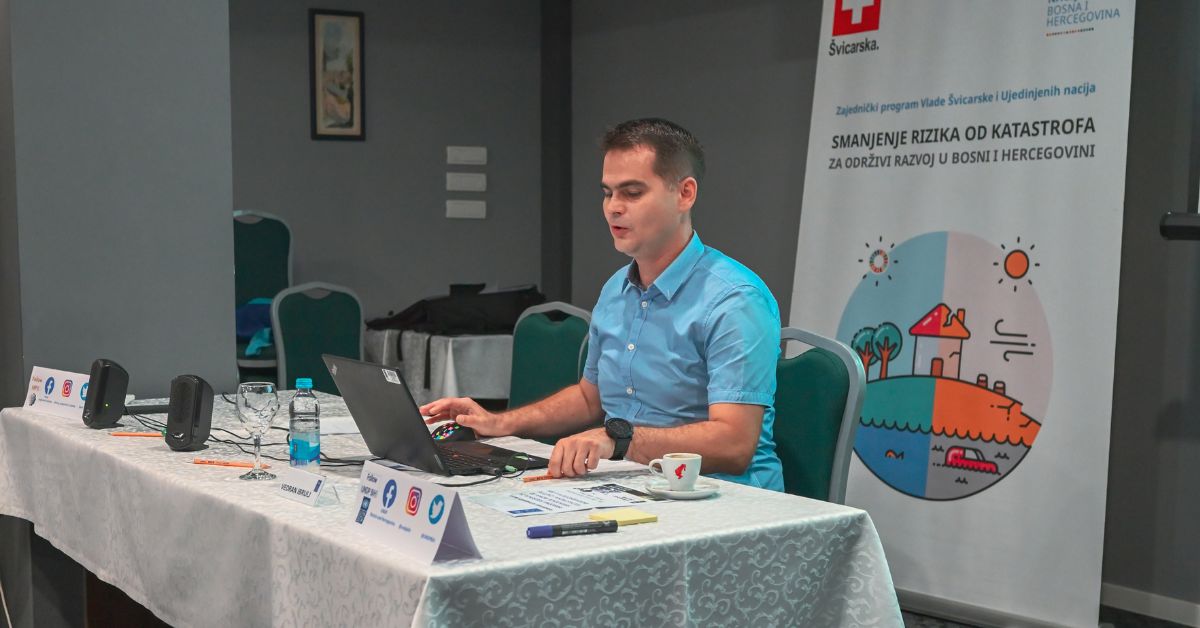Climate Action Academy - Module 2
Nature-based solutions for disaster risk reduction and biodiversity protection in Bosnia and Herzegovina
June 30, 2024

Tišina swamp
The Second Module of the UNDP BiH Climate Action Academy 2024 was successfully held in Doboj from June 28th to June 30th, 2024. The event saw the participation of selected officials from parliaments, assemblies, and councils, who had the opportunity to gain additional knowledge about natural solutions for reducing disaster risks and protecting biodiversity in Bosnia and Herzegovina.
Module II began with a discussion on the lessons learned from the 2014 floods and the importance of flood prevention and effective management. On this occasion, Dejan Danilović, project officer at UNDP BiH, presented the Flood Disaster Prevention Plan for the city of Doboj. He further explained how the damages caused by the catastrophic floods that occurred in Doboj and its surroundings in 2014 were mitigated.

Dejan Danilović
During the second day of Module II of the Academy, alongside expert lectures, participants had the opportunity to visit the Protected Area Tišina. This field visit allowed them to directly engage with the current challenges faced by this protected habitat in preserving valuable biotopes within the Tišina swamp complex. They also discussed the importance of enhancing the resilience of protected areas against threats posed by climate change.
Senka Mutabdžija Bećirović, project manager of the Sustainability of Protected Areas (SPA) project, presented ongoing activities related to the development of the Restoration Plan aimed at halting and reversing the degradation of the Tišina swamp. The goal is to achieve ecosystem improvement and biodiversity restoration within a self-regulating ecosystem that is functionally integrated into its hydrological basin.
During the lecture in Šamac following the visit to Tišina, Goran Bosankić, the Chief Technical Officer representing the UNDP BiH project "Scaling-up climate resilient flood risk management in Bosnia and Herzegovina," emphasized that "Nature-based solutions play a crucial role in protecting biodiversity and reducing disaster risks in Bosnia and Herzegovina."
By integrating ecosystem-based approaches such as afforestation, wetland restoration, and sustainable land management, we can enhance communities' resilience to natural disasters, preventing them from escalating into catastrophes. These measures not only mitigate the impacts of floods, landslides, and droughts but also preserve the rich biodiversity of the region. Implementing nature-based solutions promotes a harmonious balance between human development and environmental conservation, ensuring a sustainable and resilient future for Bosnia and Herzegovina.
"Biodiversity in BiH is facing numerous threats due to the impacts of climate change. Despite this, legislative and planning documents in the field of nature protection in BiH do not adequately recognize the necessary measures for adaptation and strengthening resilience to the effects of climate change," concluded Senka Mutabdžija Bećirović during her lecture.
The Climate Action Academy - Module II concluded with lectures from Vedran Ibrulj, coordinator of the Joint Program "Disaster Risk Reduction for Sustainable Development in BiH." He highlighted important steps that must be taken to reduce disaster risks and the initiatives that decision-makers can and should implement in the coming period to strengthen the risk management system so that weather hazards do not escalate into disasters.

Vedran Ibrulj
The Climate Action Academy provides participants, i.e., officials from parliaments/assemblies/councils in BiH, with the opportunity to gain a better understanding of climate issues and take joint actions to address the challenges posed by climate change.

Climate Action Academy - Module II

 Locations
Locations










